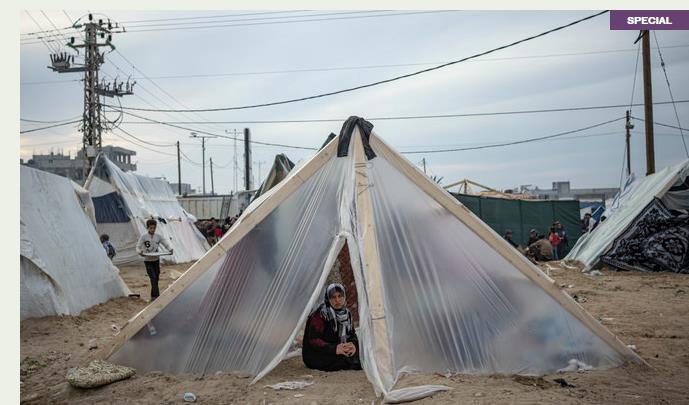
An outbreak could wreak havoc on the Palestinian territory
The territory only has 62 ventilators, with all but 15 already in use
GAZA CITY: The arrival of the coronavirus in the Gaza Strip, an impoverished enclave where the health care system has been gutted by years of conflict, raised fears Sunday the pandemic may soon prey on some of the most vulnerable populations in the world.
Authorities in Gaza, which has been under an Israeli and Egyptian blockade since the Hamas group seized power from rival Palestinian forces in 2007, confirmed its first two cases overnight, in returnees who had come from Pakistan.
An outbreak could wreak havoc on the Palestinian territory, which is home to over two million people, many living in cramped cities and refugee camps. There are similar concerns about a catastrophe if the virus turns up in war-torn Syria, Libya or Yemen.
The virus causes only minor flu-like symptoms in most people, who recover in a matter of weeks. But it is highly contagious and can cause severe illness or death in some patients, particularly the elderly and those with underlying health problems. Severe cases are often only able to breathe with respirators.
Abdelnasser Soboh, director of the World Health Organization’s Gaza office, said the territory only has 62 ventilators, with all but 15 already in use. He estimates the territory needs 50 to 100 more to address an outbreak.
With its current capacity, he estimated Gaza’s hospitals can handle the first 100 cases if they come in gradually. “If there is a spread to hundreds, this will cause a challenge to the health care system,” he said.
Gaza’s isolation likely delayed the arrival of the coronavirus, which has infected more than 300,000 people worldwide and killed more than 13,000. More than 90,000 people have recovered.
Afghanistan reported its first death on Sunday, saying a 40-year-old man died from the COVID-19 disease caused by the virus in the northern Balkh province. The war-ravaged country has reported 34 confirmed cases.
Hundreds of Gazans have returned home in the past two weeks, but only 92 people have been examined. More than 1,270 people have been quarantined at hospitals, hotels and schools after crossing into Gaza from Israel and Egypt.
The Health Ministry said the two who tested positive had been isolated at a field hospital upon arrival and did not mingle with others in quarantine.
Several countries in the Middle East have sealed their borders and ordered the closure of nonessential businesses. On Friday, Hamas ordered the closure of wedding halls and weekly street markets, after earlier closing Gaza’s schools.
In Libya, rival governments that have been at war for almost a year are each taking measures to prevent an outbreak. They have suspended public transportation, closed mosques, schools and shops, and imposed a nightly curfew as they scramble to mobilize medical resources.
The country has been mired in chaos since the 2011 uprising that toppled and killed Muammar Qaddafi. Fighting in the capital since April has displaced tens of thousands of people, and Libya also hosts an estimated 50,000 refugees and migrants from other countries. Many, including hundreds intercepted at the sea while trying to reach Europe, have been detained in squalid, overcrowded detention centers.
Yemen is also a source of concern. The country is already reeling from five years of civil war as well as cholera outbreaks that have infected more than 2 million people and killed nearly 4,000 since 2016. The World Health Organization has identified only two facilities in the country of 29 million people for quarantine and diagnosis of the coronavirus.
In Syria, where the civil war is grinding on through its 10th year, authorities have yet to report any cases but have imposed a number of containment measures, including scaling back the work of government ministries.
The worst outbreak in the region is in Iran, where the government has reported more than 21,600 cases and 1,685 deaths.
Ayatollah Ali Khamenei, Iran’s supreme leader, on Sunday refused US assistance to fight the new coronavirus, citing an unfounded conspiracy theory that the virus could have been created by Americans.
Iran is under crushing US sanctions that have devastated it economy. But Iranian officials have also come under heavy criticism for not imposing stricter measures early on to curb the spread of the pandemic.
On Sunday, Iran imposed a two-week closure on major shopping malls and centers across the country. Pharmacies, supermarkets, groceries and bakeries will remain open.
Neighboring Iraq has extended a country-wide curfew until March 28. It has the highest virus death toll in the region after Iran, with 20 fatalities among 233 confirmed cases. The country is still recovering from the costly war against the Daesh group.
The Palestinian Authority, which governs parts of the Israeli-occupied West Bank, announced a 14-day curfew for everyone except security forces, medics and food sellers. It also closed all major roads.
The biblical town of Bethlehem, the epicenter of the West Bank outbreak, has been under lockdown for weeks. Residents can still buy food from stores near their homes. The Palestinian Authority has reported 59 cases, including 17 who recovered.
Later Sunday, Muslim authorities indefinitely closed the entire Al-Aqsa mosque compound in east Jerusalem, a week after shuttering the mosque itself and the iconic golden Dome of the Rock.
Israel has reported 945 cases, the highest number in the region outside Iran. But the uptick appears to be linked to increased testing. The Health Ministry, which has tested more than 17,000 people, has reported one death and says only 20 patients are in serious condition.







